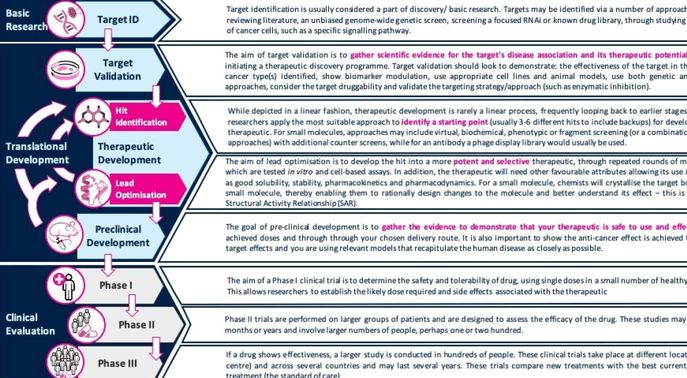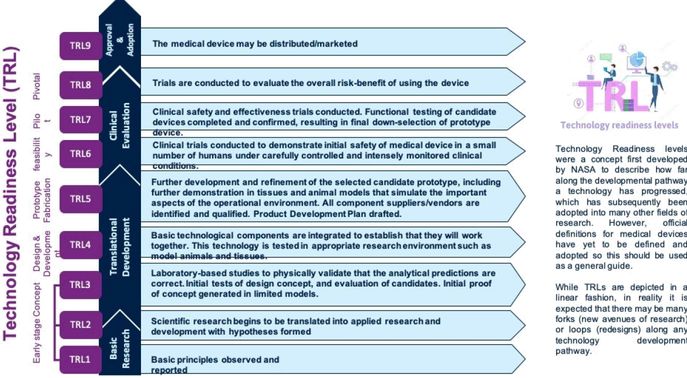Supporting translational research
The primary goal of the CRUK Imperial Centre is to help cancer researchers accelerate the translation of their lab-based research and discoveries into the clinical setting so that the scientific research undertaken at Imperial College London can directly benefit cancer patients. As a part of this goal, we are partifularly focused on developing research at the convergence of the life, clinical, engineering and physical sciences, thereby acclerating the development of the next generation of methodologies, technologies and therapeutics.
Imperial Infrastructure to Facilitate Translational Research
To help researchers identify facilities and resources at Imperial College London that may help with the translation of their research, we have created a resource guide, broadly split into two development pipelines: Medical Devices and Therapeutic Interventions.
Translational Infrastructure

Therapeutic Translational Pathway
Click on the link to download the PDF:

Medical Device Translational Pathway
Click on the link to download the PDF:
Supporting CRUK Grant Applications
 In the CRUK Imperial Centre, we know that one of the biggest obstacles to research development and translation is in securing external funding. As such, we are committed to helping every Imperial researcher that considering applying to a CRUK funding scheme and will contact any researcher who has costed an application for CRUK. We can help you identify the most appropriate funding streams for your application, discuss your outline/draft proposals, it's positioning and identify gaps in knowledge, or we can help you prepare for panel interviews.
In the CRUK Imperial Centre, we know that one of the biggest obstacles to research development and translation is in securing external funding. As such, we are committed to helping every Imperial researcher that considering applying to a CRUK funding scheme and will contact any researcher who has costed an application for CRUK. We can help you identify the most appropriate funding streams for your application, discuss your outline/draft proposals, it's positioning and identify gaps in knowledge, or we can help you prepare for panel interviews.
Please contact our Translational Research Manager, Dr Mark Gurden (m.gurden@imperial.ac.uk), to discuss your research project and how we might help with your grant application and research,
You can also explore some of the potential CRUK funding options on our CRUK Funding Routes page.
Workshops
The aim of our workshops are to provide researchers with opportunities to learn about the breadth of research at Imperial, promote and facilitate collaborations across disciplines and drive the cancer research agenda at Imperial College London.
Each year the centre plans to host a number of workshops focused on a particular area of cancer research, highlighting the current challenges that need to be addressed. As a result, we then hope to develop a number of new collaborations and ultimately develop new grant applications. Please contact the Centre if you have an idea for a workshop and we welcome the opportunity to work with other networks and centres.
Recent workshops include:
- Therapy monitoring (in collaboration with the ICR) - To discuss the current different approaches to therapy monitoring, the clinical context in which they are used and their limitations.
- Understanding and Exploiting Cancer Vulnerabilities with Chemical Biology (in collaboration with Centre for Drug Discovery Science) - A workshop exploring opportunities for new collaborations and funding routes for researchers developing chemical tool, therapeutics or exploring potential targets for cancer research
- Innovation in Early Detection of Cancer - To discuss research approaches that will lead to the development of novel methodologies and technologies allowing us to detect and diagnose cancer at earlier stages.
- Cancer Surgery workshop - To understand the challenges associated with taking novel surgical devices from a pre-clinical setting to clinical implementation
The Imperial Experimental Cancer Medicine Centre (ECMC)
The Experimental Cancer Medicine Centres are an initiative jointly supported by Cancer Research UK and the Departments of Health for England, Scotland, Wales and Northern Ireland. The Imperial ECMC is jointly led by Professor Michael Seckl and Professor Eric Aboagye. Its specific objectives are:
- To develop technology and its application in clinical studies involving imaging, biomarkers and surgery.
- To develop early phase trials with a focus on reversing therapy resistance in breast, ovary, haematological, prostate, lung and pancreatic cancers.
The ECMC has dedicated laboratory at Hammersmith Hospital in B-Block that can help with early translational studies. The type of services that are offered are:
- Biobanking
- Immunohistological analyses
- DNA methylation analyses
- Biostatistics
- Metabolomic analyses
- Circulating biomarker analyses
See the Imperial ECMC website for further details, or contact the EMCM Centre Managaer Naina Patel (naina.patel@imperial.ac.uk).
The Ciculating Biomarker Laboratory
The new BRC-funded Circulating Biomarker Laboratory was set up in partnership with Imperial Experimental Cancer Medicine Centre and the Cancer Research UK Imperial Centre, to harness the vast potential of ‘liquid biopsy’ in tailoring cancer treatments and monitoring disease progression.
This new facility is focused on the detection, isolation and analysis of circulating tumour cells (CTCs) and cell-free circulating tumour DNA (ctDNA) from patient blood samples, or any other rare cell population that can be found in the blood.
Subsequent molecular analyses, including various genomic and transcriptomic options, can be delivered through NIHR Imperial BRC’s Genomics facility.
To discuss potential projects or collaborations, capabilities and pricing, please contact the facility Manager Dr Georgios Nteliopoulos, georgios.nteliopoulos04@imperial.ac.uk.
To see more details on the facility and technologies used, please visit the Imperial BRC website and click the link to view the presentation.
Clinical Trials
Clinical studies can also be supported through Imperial Cancer Clinical Trials Section (CCTS). The CCTS provides a comprehensive service to support clinical principal investigators in the process of clinical trial development, from concept and trial design, through to statistical support, application preparation, application submission and trial set-up.
Please contact the clinical trials manager, Philip Badman (p.badman@imperial.ac.uk), to discuss potential support for cancer clinical trials .


